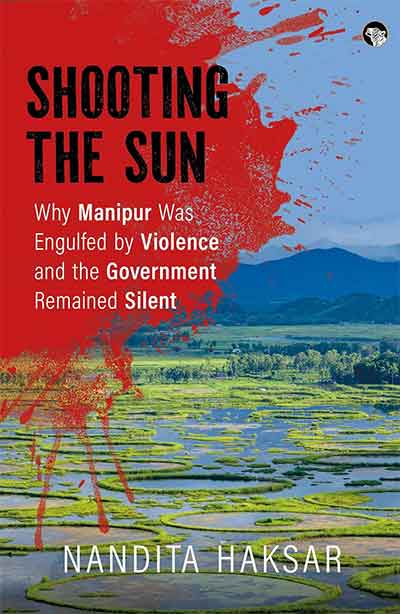
The current events in the troubled state of Manipur remind me of a very powerful Manipuri play Draupadi I saw at Prithvi theatre in Mumbai more thana twenty years ago. A man sitting next to me was taking down notes. I thought he was a theatre critic but since I had not seen him as a critic earlier I asked him his name. He coolly told me he was from army intelligence.
The play powerfully depicted the plight of a Manipuri woman who is raped by the armed forces. It was directed by the reputed Manipuri director Kanhailal and the main role was played by his wife Sabitri, one of the finest actresses in the country but regrettably not known much.
Sadly, the theatre establishment in Mumbai ignored the play. I can say for sure because I was present at both the performances.The production was one of the most memorable performances I have seen during fairly regular theatre viewing in the last three decades.
I wrote on it in The Times of India but almost the entire other media did not take cognizance of this terrific event.
Manipur, the remote corner of India, has produced some of the most outstanding modern theatre in this country. Kanhailal has done far more meaningful theatre but it is Ratan Thiyam who gets all the attention. That is partly because Kanhailal is severely anti-establishment while Thiyam’s plays, while they are very innovative and spectacular, they do not trouble the conscience of the viewer.
Just a few days before Kanhailal’s play was staged in Mumbai, there was a performance of Thiyam’s spectacular production based on Kalidas’s Sanskrit classic Ritusamhar on the beauty of nature. In fact, it was the inaugural show at Tata theatre of the national theatre festival organized by the Sangit Natak Akademi
Thiyam’s play was visually superb with fine choreography, music and dance and while one praised it one could not help wondering it did not look rather odd in the given socio-economic-political situation. Kalidas is unique in depiction of Nature and a pioneer in the world in that sense. But still.
As I look back on Kanhailal’s play Draupadi, based on Mahashweta Devi’s work, I now realize even more strongly how much more relevant and meaningful this play was in comparison to the visually appealing Thiyam play.
Kanhailal’s play reflected a sad socio-political reality of contemporary Manipur. In the background of the storm in Manipur over the rape and murder of Manorama, a 32-year-old activist by the forces of 17 Assam Rifles in Imphal, one realizes theatre can not only mirror reality but also anticipate it.
It is a pity that even the literate crowd in Mumbai was not only not bothered about the democratic struggle being waged by the Manipur people but they are not aware of its superb theatre.
This remote corner of India has also produced quite a popular play on 9\11 attack in the U.S. Oddly, I found a long article on it not in any Indian newspaper but in the prestigious American theatre quarterly Tulane’s Drama Review, its Summer issue., in the United States Information Service library.
Though it was not critical of the United States, the play’s actors were regularly interrogated and detained by the security forces in Manipur as they criss-crossed the valley with the play. The author of the article L Somi Roy is a Manipuri living in the U.S. She has made a video film on the play during her visit to Manipur but oddly few in the U.S. dare to screen it, such is the state of freedom in that country which boasts of a strong democracy. And this is despite the fact that the play is not anti-American as mentioned earlier. But it gives a platform to a Bin Laden character to express his views.
The play is written by Ranjit Ningthoya, a 30-year-old writer and directed by Birjit Ngangombia. It is a politically informed play and humanistic in tone, the article writer says. Manipur is virtually closed to foreigners and it is remarkable that it has produced this play while most of the urbane, outside world exposed to American influence, if one cannot call it American imperialism, has not bothered to look at one of the most significant events of recent times. This need not be a surprise really because the establishment has more or less ensured that theatre people do not turn rebels. This is done through various means like giving them sufficient grants or foreign trips to ensure conformism.
No wonder much of our theatre is so docile and it refuses to ask inconvenient questions to the establishment while it makes every effort to censor non-conformism of all kinds. In a way I think the presence of an army intelligence man , which I noted at the Kanhailal play, testifies to the power of the play, its raising serious issues affecting the masses.
It is an indication of the utter callousness of our society that a couple of protest meetings held in Mumbai to condemn the military brutality in Manipur attracted little attention.
Nandita Haksar, reputed human rights activist and Supreme court lawyer, was a star speaker at two meetings, one held at Press Club and the other at Vanmali hall in Dadar. Unfortunately, more or less the same audience was present at both the meetings, such is the apathy of our ;people, said activist and lawyer Sanobar while talking to me during a demonstration held at Churchgate station on Monday to condemn the attack on journalists Nikhil Wagle and Sajid Rashid.The latter is no longer with us.
Nandita Haksar made some very pertinent points. She said all the militant movements in the country began as peaceful protests but these took to arms because the establishment refused to take note of the peaceful demands.
The atrocities committed by our security forces in Manipur are comparable to those inflicted by the American military on Iraqi prisoners in Abu Ghraib, Nandita said. She said it was difficult to find democratic space even in liberal institutions in New Delhi to screen films which challenge the establishment point of view Abu Ghraib reminds me of an excellent long article titled Making Torture Legal in the New York Review of Books written by Anthony Lewis.
After Draupadi premiered in Imphal on April 14, 2000, the production had to be stopped after only two shows under tremendous backlash from across Manipuri society. Critics, including feminist groups, as well as the general public, felt offended by and objected to the nude scene at the end of the play, where Sabitri, playing the character of Dopdi Mejhen in the performance, bares herself before the army personnel raping her, in an intrepid act of defiance. Kanhailal was pronounced as possessing a depraved and perverted sensibility for conceiving the scene, and Sabitri was called a shameless and notorious woman for baring her body on stage. A select group of male intellectuals, however, spoke in favor of the production, declaring it a valid mode of protest against the Indian Army’s repeated sexual assaults against Manipuri women. The controversy raged in the local media for the next four months, as one expert pointed out.
Vidyadhar Date is a senior journalist, theatre critic and author of a book on public transport












































